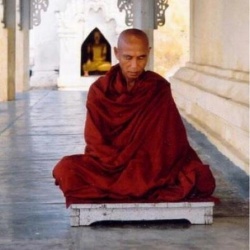Kumarayana
Kumarayana
[鳩摩羅炎] (n.d.) (Skt; Jpn Kumaraen)
The father of Kumarajiva. He lived in the fourth century and was the son of a minister of an Indian kingdom, but forsook his position to enter the Buddhist Order. He left India and crossed the Pamir range to the north, traveling toward China. In the Central Asian kingdom of Kucha, he was officially welcomed by the king and was designated as teacher of the nation. In compliance with royal decree, he married Jivaka, the king's younger sister, and called their son Kumarajiva, combining their names. According to legend, when Kumarayana left India, he brought with him a statue of Shakyamuni Buddha. It is said that he carried the statue during the day, and at night the statue carried him.
Kumārāyana (also Kiu-mo-yen) was an intelligent man from a noble family in India, whose grandfather Ta-to was supposed to have had a great reputation. Kumārāyana renounced his wealth to become a Buddhist monk, and left India, crossing to the Pamirs to arrive in Kucha. There he became the royal priest, and the sister of the king, Jīva, fell in love with him. They married to produced a son called Kumārajīva who, largely under Jīva's guidance, went on to become an erudite Buddhist scholar and translator.
